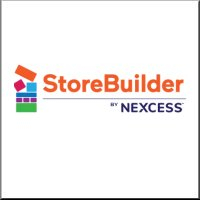Ecommerce website builder vs ecommerce platform vs storefront builder: what's the difference?
Find out which one is the best solution for your online store

Over the past decade, the concept of the shop has been slowly but surely shifting from the old-fashioned brick-and-mortar business to the brand new world of virtual shopping. After this shift was accelerated by the pandemic, many shopkeepers were forced to choose between moving their stores online or closing them for good.
Some of these stores already had an online presence in the form of a website, so the only thing left to do was to upgrade it with a suitable set of ecommerce tools (basically, everything an old-school shop has but on the Internet). Other shopkeepers were new to the ways of the web and were challenged to start everything from scratch.

Try StoreBuilder Risk Free For 30 Days
Create an online store that’s customized, beautiful, and unique in just a few clicks with StoreBuilder by Nexcess. Hundreds of dollars worth of features bundled for only $19 a month.
While building an online store can look intimidating at first, there is a wide selection of services out there whose sole objective is to simplify the process so that pretty much anyone can create a fully functional yet visually attractive online store in a matter of minutes. However, before getting the creative juices flowing we should speak about different ecommerce website building tools and services to find out which one you should start building your store with: a storefront builder, an top ecommerce website builder, or one of the best ecommerce platforms?
Main similarities and differences
While the terms “ecommerce platform”, “ecommerce website builder” and “storefront builder” are sometimes used interchangeably to describe the same thing, they aren’t quite the same. Yes, all three solutions share a sole purpose to facilitate the process of otherwise demanding task of building your online store, but they differ when it comes to functionality. Therefore, before picking up any of these it’s vital to have a vision of how big your store will be, how much time you are willing to invest in its creation, and how much money you are willing to part with.
Simply said, what an ecommerce storefront (sometimes also called digital storefront) is to an online store is the same as what a storefront is to a brick-and-mortar store. It gives the customers the first insight into the store you run, the products you sell, and the overall impression you want to leave.
A storefront-builder solution is the simplest way to expand your store online as it offers ease of use of an ecommerce website without the need to create your own website, although you can use it to build a storefront on your site as well. For instance, one of the ways to sell stuff online without your own site is through ecommerce marketplaces (such as Amazon, eBay, and Etsy), where you can have your storefront and even customize it to your liking via built-in storefront-building software.
Same as with a storefront builder, with an ecommerce website builder you can create an online store from scratch without being familiar with a line of code. However, since an ecommerce website builder is basically a regular website builder fine-tuned in line with the needs of ecommerce, it requires you to have a website (which includes a domain name and a suitable web hosting solution).
Are you a pro? Subscribe to our newsletter
Sign up to the TechRadar Pro newsletter to get all the top news, opinion, features and guidance your business needs to succeed!
Although ecommerce website builders come in many shapes and sizes, if you’re looking for anything more than web design and simple customization (for instance, to access the theme's source code), you’ll have to consider other solutions.
Enter the ecommerce platform, an end-to-end software solution for successfully selling all sorts of products online. It will supply you with all the essentials and let you customize your store in any way you wish. Besides providing all features of a storefront builder and a website builder, an ecommerce platform often offers a higher level of flexibility, capable 24/7customer support, in-depth analytics and reporting, an app store, powerful marketing tools, plenty of payment gateways, a stronger security system, and much more.
To put similarities and differences between these solutions in simple terms, both a storefront builder and an ecommerce website builder can be components of an ecommerce platform, but this can’t be the other way around.
Pricing
One of the common-sense things to think about before choosing one ecommerce website building solution over the other is its pricing, and when it comes to pricing there is one universal rule: as the complexity of the service grows, so does its price.
While storefront builders and website builders sometimes come as a complementary element of other services (such as a web hosting solution, or using an online marketplace) to get your hands on an ecommerce platform you’ll be expected to spend some cash. Of course, there are exceptions (such as WooCommerce, Square Online, and Wix Ecommerce) with which you’ll get to use the platform free of charge with access to additional plugins and extensions, some of which are also free. However, there are some strings attached to the price (there always are).
Although most ecommerce platforms come with a low entry-level price tag, offer free trials, and provide a refund policy, the drawbacks range from additional setup fees, pricey add-ons, and hefty transaction fees, to time spent on installing, configuring, and customizing your online store.
Therefore, if you’re just starting out or searching for a simple yet pocket-friendly ecommerce solution to create a basic site for a small business, then both a storefront builder and a website builder are a good choice. They will cost you much less than an ecommerce platform yet supply you with a basic set of tools needed to set everything up.

Functionality and ease of use
When we set pricing aside, the primary difference between a storefront builder, an ecommerce website builder, and an ecommerce platform is in their functionality. While the first two concentrate on supplying tools to make sure your store-building experience is as seamless as possible, an ecommerce platform involves more complexity than simply setting up a store and starting to sell stuff.
All ecommerce platforms are not created equal, however. The hosted ones (like Shopify, BigCommerce, and Volusion) will offer to host your store, while the self-hosted platforms (such as WooCommerce, OpenCart, and PrestaShop) will provide you with the software but expect you to find a hosting solution on your own. Some of them will charge you a pretty penny but come with a full set of features, while others come at pocket-friendly prices but will charge you extra cash for each feature. Also, some offer free plans but will bombard your store with unwanted ads until you upgrade to a paid plan (yes, we mean you, Wix Ecommerce). And again, some platforms are geared towards tech-savvy users (sorry, Magento) while others will gladly handhold you through the whole journey (thanks, Zyro).
All in all, even if you’re sure that you want to use an ecommerce platform, picking out the right one for you will call for deeper consideration.
To conclude, if you are looking for customizability, scalability, and size, then one of the ecommerce platforms is a way to go. On the other hand, if you are more concerned with simplicity, beginner-friendliness, and starting slow, then an ecommerce website builder will do the trick.
Customization
A user-friendly interface, a product display, online ordering software, inventory management apps, a billing and payment processing system, security and data protection, customer support, marketing strategies and promotions, and analytics are all integral parts of an ecommerce store. However, besides being fully functional and convenient to use, you’ll want your online store to stand out among its competitors, and the easiest way to do that is to enhance the way it looks and feels.
While most storefront and website builders offer a decent variety of professional ready-made templates, with an ecommerce platform you can expect to get a wider selection of themes and templates and customize them in any way you choose. And if you opt for an open-source platform (let’s say WooCommerce) the sheer number of options will go through the roof (largely thanks to its committed online community). However, we wouldn’t advise you to go with an open-source platform unless you have some technical know-how and developer skills.
In addition to themes and templates, to further customize your online store you can add plugins, add-on applications, and features, which is something you should find in abundance on any well-known ecommerce platform. Some of these will come completely free, others will come with a price tag, but you’ll surely find more of them on any ecommerce platform than with ecommerce storefront or website builders.
You should also keep in mind that different platforms will have different features available. Some of them will stick to simplicity for the sake of stability (a bit like Shopify) while others will make compromises on stability in favor of customization (somewhat like WooCommerce). For instance, with Shopify, there are certain parts of your store (like the checkout page) where you won’t be able to change much, while with WooCommerce you can change pretty much anything (the checkout page included).
However, if you’re starting a small online shop without too many products or you don’t care much about the customization, then an ecommerce platform might be overkill.

Payment gateways
As a one-stop solution for an online store, ecommerce platforms are made to be integrated with a variety of third-party apps, including payment gateways. Most of the well-known platforms will provide access to around fifty different payment gateways (such as PayPal, Stripe, Afterpay, Square, and Amazon Pay) and with some ecommerce platforms, you can work with multiple gateways without being charged extra cash for the set-up. What’s more, most platforms offer a diverse range of payment methods such as e-wallets, COD (cash on delivery), money orders, checks, direct bank transfers, purchase orders, and so on.
With ecommerce website builders you should get access to multiple payment gateways, but in comparison with ecommerce platforms, this number will look somewhat limited.
It’s a similar case with storefront builders since they usually come as a part of a larger system (for instance, an ecommerce platform) so the payment gateways they support depend on the system on which they are built.
Marketing
Creating a spectacular online store stocked with good-looking products and attractive price tags is great but unless customers can find it, it’s all in vain. Fortunately, most ecommerce platforms offer SEO tools, which will make your site pop up higher among search engine results (mostly Google). They also provide advanced analytics and data reporting, with which you can track everything on your site and tweak it to perfection.
You could also use a selection of marketing tools and opportunities such as mobile optimization, CRM (customer relationship management) software, paid ads, affiliate marketing, product reviews, discount codes, gift cards, email and social media marketing, influencers, and so forth. With most popular website builders optimized for ecommerce (but not created with ecommerce in mind) you can hope to get some email marketing tools, mobile responsiveness, some SEO, and that’s about it. On the other hand, website builders that were created especially for ecommerce and are backed by a platform (such as Shopify) should offer more than bare-bones in terms of marketing.
However, if you’re just getting started it’s not a bad idea to set up a storefront on one of the massive online marketplaces (a monarch among them being Amazon) that are trusted by millions of buyers all over the globe. Although you won’t get all the bells and whistles of online promotion with marketplaces like Amazon, simply having a store there is an advertisement in itself. What’s more, with Amazon Storefront brands can create their unique miniature ecommerce website while still selling their products on Amazon.

Security
If you are going to make it in this business, you’ll want to make sure that security is one of your top priorities from the get-go. Besides safeguarding your store from all sorts of cybercriminals, you also need to be confident that information about your customers is safe and secure. Some of the ways to do so involve ensuring that your store has PCI-DSS (Payment Card Industry Data Security Standard), an SSL certificate, fraud-prevention software, keeping regular backups, constantly updating your site and safety plugins, using 2FA (two-factor authentication), and never overestimating the strength of your security.
It’s also important to use a rock-solid web hosting provider, whether you’re using an independent web hosting service for your store or one that is part of an ecommerce platform solution. Before putting your store in the host’s hands, check out how they stand when it comes to security (DDoS protection, antivirus, spam filter, domain privacy, firewalls, data backups, and SSL). Also, keep in mind that your online store is only as secure as you make it.
Customer support
Whether you are a new ecommerce entrepreneur or a seasoned online storekeeper it’s unlikely you’ll avoid all the bumps in the road while running your store. This is where strong customer support should come in hand and provide you with ways to face your challenges and overcome your concerns while saving you time (and money).
Almost all ecommerce platforms, website builders, and storefront builders come with step-by-step guides, often supported with screenshots or videos tutorials. Among the self-services, you should also find a FAQ section, a knowledgebase, blog articles, and a community forum where you can meet fellow users and ask for advice. However, the scope of self-service options largely depends both on the popularity and the price of the ecommerce solution you are using.
For instance, with open-source ecommerce platforms (WooCommerce in particular) you can be a part of a colorful developer community, keep in touch with its veterans, and get considerable support in times of trouble. On the downside, to get access to professional support channels (such as live chat, phone line, and ticketing system) with these types of platforms you’ll usually be expected to pay big bucks. In contrast, with SaaS-based platforms (such as Shopify), the support staff is often available round-the-clock via phone, live chat, and email.
Ultimately, when it comes to customer support, the age-old rule seems to ring true: you get what you pay for.

Which is the best choice for you?
Choosing what type of ecommerce solution works best for you is the first step of starting your online store. If you already own a website that you wish to expand and intend to start small without selling too many products, then an ecommerce website builder should suffice. You don’t have to know a thing about coding and most of the top website builders feature a drag-and-drop editor with which you can create your shop swiftly and simply.
If you are a tech-savvy WordPress enthusiast, then an open-source ecommerce platform known as WooCommerce might be a wise choice, since it will give you complete control over your site. However, if you’re not too crazy about WordPress but want control, there are other open-source platforms worth checking out.
On the other hand, if you don’t mind investing a tidy sum into an all-inclusive ecommerce solution that will give you total control over a store’s design, full set of features, well-stocked app store, and comprehensive 24/7 customer support, you can’t go wrong with one of the SaaS ecommerce platforms. They also typically provide a money-back guarantee to all new customers, just for good measure.
We've also featured the best ecommerce hosting, best ecommerce platforms and best ecommerce website builder
Mirza Bahic is a freelance tech journalist and blogger from Sarajevo, Bosnia and Herzegovina. For the past four years, Mirza has been ghostwriting for a number of tech start-ups from various industries, including cloud, retail and B2B technology.
